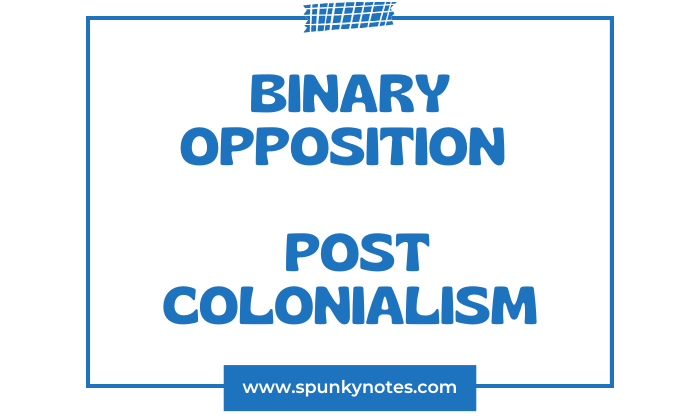

Estimated Reading Time: 10 min
Binary opposition is a critical concept in postcolonial theory. It refers to how colonial discourse establishes a clear divide between two opposing groups or ideas.
Typically, these are the colonizer and the colonized, or the “self” and the “other.” This divide creates a hierarchy where one side, usually the colonizer, is privileged or seen as superior.
Meanwhile, the other side, the colonized or “other,” is marginalized and viewed as inferior. These oppositions do more than enforce control over the colonized.
In postcolonial studies, binary opposition is seen as a tool used by colonial powers to justify domination. Colonizers define themselves as “civilizēd,” “rational,” and “advanced.”
In contrast, they depict the colonized as “sāvage,” “irrational,” or “primitivē.” By establishing these oppositions, colonizers reinforce a sense of superiority.
They portray colonialism as a civilizing mission, thus excusing the exploitation of other cultures.
Binary Opposition in Postcolonialism
Superior/Inferior
Colonizers often positioned themselves as superior to colonized populations, viewing their own race, culture, and practices as inherently better.
This binary helped justify colonization and “civilizing” missions, claiming that colonized people were inferior and needed Western guidance.
Postcolonial scholars study this binary to reveal how it helped maintain colonial control.
Colonized people were portrayed as less intelligent or capable, which was used to justify restricting them to roles in labour or servitude. This idea of superiority supported racial and cultural discrimination.
Civilized/Primitive
Colonizers labelled their societies as “civilizéd” while depicting colonized societies as “primitivē.” This narrative portrayed indigenous practices, languages, and beliefs as inferior.
This view fueled efforts to “educate” and “modernize” the colonized.
Postcolonialism critiques this view by reclaiming indigenous knowledge systems and cultural practices as equally valuable.
Good/Evil
Colonial narratives often cast the colonizers as “good” or morally superior while portraying the colonized people and cultures as “evil” or corrupt.
This binary justified acts of violence, conquest, and forced conversion under the pretence of eradicating “evil” and spreading “good.”
For example, Indigenous practices were often depicted as “evil” superstitions in need of reform by the “good” influence of Western religion and governance.
This oversimplified binary erased the Indigenous belief systems and justified colonial intervention as a moral duty.
Standard/Dialect
Language was a powerful tool for colonial control, as the colonizer’s language (often English or French) was established as the “standard.”
Indigenous languages were often dismissed as dialects, marking them as lesser and unworthy of academic recognition.
Postcolonial theorists believe that the use of colonial languages limited cultural expression and erased indigenous knowledge. Bringing back native languages and forms of expression is a way to resist these limits and make them valued again.
Colonial language fluency became essential for social and economic success in many colonized countries, sidelining native languages.
This contributed to the loss of cultural heritage and traditional knowledge embedded in native languages.
Modern/Backward
Colonizers viewed Western industrialization, science, and technology as marks of “modernity” while labelling colonized societies as “backwards.”
This binary justified economic and cultural interventions, as colonial powers felt it was their duty to “advance” these societies.
Postcolonial theory challenges this view by highlighting the value of traditional practices and critiquing the assumption that Western models are universally ideal.
Indigenous agricultural, medical, and environmental practices were often disregarded as backward.
Today, postcolonial scholarship re-evaluates these practices as sustainable and culturally significant, offering alternatives to Western developmental models.
Free/Dependent
Colonizers promoted the idea that their own societies were free and independent, while the colonized were seen as dependent on colonial “protection” or “guidance.”
This binary justified the control over colonized territories, suggesting they were incapable of self-governance.
Postcolonial thinkers emphasize the damage of this dependency narrative, which often persisted even after independence.
Colonial powers portrayed colonized nations as unable to manage resources or govern effectively, justifying their control.
Rational/Irrational
Colonizers often associated themselves with rationality and science, framing the colonized as irrational or superstitious. This dismissed indigenous beliefs, traditional medicine, and local systems of governance.
Postcolonial theory challenges these assumptions, showing that “irrational” beliefs are often systems of knowledge and social cohesion that deserve respect.
Colonial powers dismissed Indigenous spiritual beliefs and practices as irrational or primitivē, promoting Western science as the only valid form of knowledge.
Urban/Rural
Colonizers associated urban spaces with advancement, culture, and civilization, while rural areas, often inhabited by indigenous people, were viewed as undeveloped.
This binary marginalized rural practices and people, leading to policies that prioritized urban development at the expense of rural communities.
Postcolonial theory critiques this bias by highlighting rural life’s cultural richness and sustainability.
Christian/Pagan
Colonizers used Christianity as a mark of civilization, viewing native religions as pagan and unworthy. This justified missionary work and religious conversion efforts as part of the colonial mission.
Postcolonial studies examine how these religious impositions affected indigenous spiritual life, contributing to cultural erasure and identity conflict.
In postcolonial discourse, reclaiming indigenous religious practices becomes a form of resistance.
Colonial powers pressured or forced Indigenous communities to convert, dismissing their traditional beliefs as “pagan.”
Developed/Underdeveloped
This binary labelled Western societies as developed and the colonized as underdeveloped, justifying economic exploitation and imposing Western development models.
After decolonization, this binary continued through international development policies, often disregarding indigenous economic practices.
Postcolonial scholars challenge this binary by advocating for economic models that prioritize sustainability, equity, and cultural relevance.
Colonized economies were changed to meet colonial demands, often limiting local economic practices. Postcolonial economists argue for development that respects traditional systems and regional autonomy.
Universal/Local
Western values, knowledge, and practices were positioned as “universal,” dismissing indigenous knowledge as merely “local” and insignificant. It reinforced the belief that colonized societies should adopt Western norms.
Postcolonial thought challenges this assumption, emphasizing the value of local knowledge and practices and advocating for diverse perspectives in global discourse.
Western science and literature were prioritized, sidelining traditional medicine and storytelling. Postcolonial movements work to recognize and elevate indigenous knowledge and culture on equal footing.
Scientific/Spiritual
Colonizers often viewed their scientific approach superior to colonized cultures’ spiritual beliefs. This binary dismissed traditional knowledge as unscientific or superstitious.
The postcolonial theory emphasizes the importance of Indigenous spiritual systems and examines the imbalance caused by favouring scientific views over spiritual ones.
Colonial authorities viewed traditional healing practices as ineffective compared to Western medicine. This led to a loss of cultural and spiritual identity.
Center/Margin
Colonial powers positioned themselves as the cultural “center,” with colonized lands seen as the “margins” or periphery. This marginalization reinforced colonial power structures, rendering the cultures of the “margin” less important.
Postcolonialism challenges this binary by advocating for the recognition and value of marginalized cultures.
Black/White
The racial binary of Black and White supported colonial ideologies that labelled Black individuals as inferior and White as superior. This division contributed to racial discrimination and justified exploitation.
Postcolonial theorists expose how this binary influenced colonial policies and perpetuated systemic racism.
Colonial powers often looked down on societies in Africa, Asia, and the Caribbean based on skin colour, impacting socio-economic structures and cultural identity.
Normal/Exotic
Colonizers viewed their own culture as the “norm” and labelled colonized societies as “exōtic” or unusual. This binary portrayed indigenous cultures as exōtic curiosities rather than as valid ways of life.
Postcolonial studies criticize this view and advocate for the normalization of cultural diversity.
Enlightened/Backward
Colonizers saw themselves as “enlightened” and depicted colonized societies as “backwards.” This binary was used to justify colonial “reforms” in law, education, and religion.
Postcolonial thought emphasizes the richness and wisdom of indigenous practices.
Colonial education systems aimed to “enlighten” indigenous populations, dismissing traditional education and customs as backward or unworthy.
Modern/Traditional
Colonizers positioned modern Western culture as superior to the “traditional” cultures of colonized societies. This binary diminished the value of indigenous customs and contributed to the loss of cultural heritage.
Postcolonialism seeks to elevate traditional practices as culturally significant and sustainable.
Western agriculture replaced Indigenous farming techniques, often causing adverse environmental impacts.
Progressive/Regressive
Colonial powers framed their society as “progressive” and the colonized as “regressive.” This binary encouraged the idea that colonized societies needed Western intervention to become “civilizéd.”
Postcolonial critiques reveal the cultural harm caused by this perspective and advocate for the value of diverse paths to progress.
Colonial policies often sought to replace traditional systems with Western “progressive” models, undermining local governance.
Self/Other
Colonizers viewed themselves as the “self” and the colonized as the “other,” creating a sharp division that justified control. Colonial powers portrayed the colonized as different and inferior, reinforcing their marginalized status.
Postcolonial theory focuses on reclaiming identity and breaking down these imposed divisions.
By constructing the colonized as “other,” colonial powers controlled the narrative, maintaining dominance and marginalizing local voices.
Educated/Ignorant
Colonizers considered themselves “educated” and depicted indigenous people as “ignorant.” This binary dismissed traditional knowledge and justified Western educational reforms.
Postcolonial studies challenge this view, valuing indigenous wisdom and knowledge systems.
Colonized people were often denied educational opportunities, reinforcing the idea of ignorance and limiting their socio-economic growth.
Ruler/Subject
Colonizers positioned themselves as rulers over colonized subjects, creating a binary that reinforced power dynamics. This relationship justified colonial control by defining the colonized as needing governance.
Postcolonial theory critiques these structures and advocates for autonomy and self-governance.
Colonial administrations imposed authority over native rulers, undermining local sovereignty and cultural practices.
Metropolitan/Provincial
Colonizers viewed their urban, metropolitan areas as centres of culture and progress, while colonized regions were labelled as “provincial” or undeveloped. This binary marginalized local cultures and economies, prioritizing urban development.
Postcolonial theory critiques this bias by highlighting rural life’s cultural richness and sustainability.
Authority/Subordination
Colonial powers asserted authority over colonized people, creating a binary of authority and subordination. This relationship justified control and oppression, treating the colonized as inherently subordinate.
Postcolonialism works to dismantle these hierarchies and advocate for equality.
Colonial laws placed colonizers in positions of unquestioned authority, reducing indigenous leaders to subordinate roles.
Voice/Silence
Colonizers gave themselves a voice while silencing the perspectives of the colonized. This binary controlled the narrative, limiting the colonized from sharing their experiences.
Postcolonial theory emphasizes the importance of reclaiming this voice and promoting diverse perspectives.
Literature, history, and media often portrayed only the colonizer’s perspective, silencing Indigenous voices and experiences.
In postcolonial theory, these binaries are tools of control to justify dominance and suppress indigenous cultures, beliefs, and practices.
Postcolonial scholars argue that challenging these binaries is crucial for re-establishing formerly colonized societies’ cultural identity, agency, and equality.
Implications of Binary Opposition
Postcolonial theorists, including Edward Said, Gayatri Spivak, and Homi Bhabha, criticize these binaries. They emphasize that binaries oversimplify complex societies and reinforce harmful stereotypes.
Edward Said’s work, particularly Orientalism, examines how the West constructed the East as an exōtic, inferior “other.” This construction helped solidify European dominance.
Spivak’s work, including her famous essay “Can the Subaltern Speak?” addresses how these binaries silence the voices of the colonized. They make colonized people voiceless or marginal in history and literature.
Homi Bhabha adds to this critique by introducing concepts like hybridity. These concepts break down binary distinctions, suggesting that cultural identities are more fluid and interconnected.
He argues that colonial contact creates hybrid identities that don’t neatly fit into “self” and “other” categories. This challenges the rigid binaries established by colonial thought.
By challenging these binaries, postcolonial theory reveals the complexity of cultural identities and emphasizes the interconnectedness of the colonizer and the colonized.


